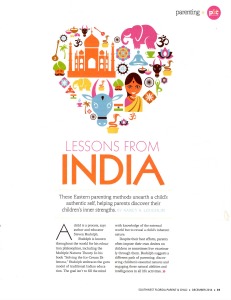Lessons from India
These Eastern parenting methods unearth a child’s authentic self, helping parents discover their children’s inner strengths.
By Nancy B. Loughlin
Published in Parent and Child Magazine, December, 2014
A child is a process, says author and educator Steven Rudolph.
Rudolph is known throughout the world for his education philosophies, including the Multiple Natures Theory. In his book “Solving the Ice-Cream Dilemma,” Rudolph embraces the guru model of traditional Indian education. The goal isn’t to fill the mind with knowledge of the external world but to reveal a child’s inherent nature.
Despite their best efforts, parents often impose their own desires on children or sometimes live vicariously through them. Rudolph suggests a different path of parenting: discovering children’s essential natures and engaging these natural abilities and intelligences in all life activities.
“When kids are naturally inclined to excel, you get a lot more return on your investment,” Rudolph says via Skype from India. He is founder and director at the Jiva Public School he founded there.
Children are usually not inherently in tune with their inner landscapes because they exist in an externally oriented world. Kids are bombarded with visual and auditory stimuli that interfere with their abilities to move inward and connect with their authentic selves. The compounded influence of parents, teachers, friends and media – what Rudolph calls the “Four Forces” – makes self-exploration difficult if not impossible.
Rudolph’s Multiple Natures theory details nine potential natures of an individual: protective, educative, administrative, creative, healing, entertaining, providing, entrepreneurial and adventurous. When these are combined with an awareness of a child’s natural intelligences, or aptitudes, as defined by psychologist Howard Gardner, you get a unique mosaic that is useful for identifying hobbies, potential passions and future careers.
Rudolph suggests a Multiple Natures/Intelligence test when a child reaches age 13. He reminds parents that they shouldn’t become slaves to the test but recognize it as a valuable tool for self-awareness, both for the child and the parent. You can find the test online at stevenrudolph.com.
Rudolph reminds parents to be aware of their own intelligences and natures and how they might conflict with but hopefully enhance the self-awareness processes of their children.
“Once parents truly understand themselves, they will be able to facilitate this process in others,” Rudolph says.
Knowing your child’s doshas
Parallel to Rudolph’s Multiple Natures idea is a method of using Ayurveda doshas to draw out your child’s inner strengths.
Your child’s dosha is his or her energetic DNA. According to Ayurveda, an ancient Indian medicine system and sister science to yoga, every human being has a doshic makeup that is set at the moment of conception.
Each person is a unique combination of three energies: Vata, Pitta and Kapha. Although the doshic constitution never changes, there are frequent imbalances that can be remedied with diet and herbal treatments as well as changing and adjusting lifestyle patterns.
When parents know their children’s doshas, they can help their children move with ease through the ebb and flow of life, says Julie Comer, an Ayurvedic practitioner at Joyful Yoga in Bonita Springs. They can also know ahead of time how their children are going to react under pressure.
An Ayurvedic practitioner can determine a child’s doshic constitution as well as diagnose imbalances and suggest therapeutic treatments.
“Ayurveda is a harmonious tradition. It isn’t about pigeonholing a child but helping that child live in a state of peace and equanimity,” Comer says.
The most important Ayurvedic point for parents to understand, Comer says, is that the first 18 years of life are Kapha years. These Kapha years demand love, hugs, understanding and patience to nourish children emotionally. Although nurturing a child is a given, knowing a child’s dosha can fine-tune the process.
Vata children: Vata energy controls all movement in the universe and within the self. Vata kids want to play all day. They can be imaginative on an abstract scale, weave inventive stories, indulge in a colorful fantasy life and may be the ones most likely to have an imaginary friend. These are the children who wander and get lost. Given that Vata children disappear into their own worlds, routine is essential for such kids. Although structure is valuable for all children, Vata children will reap the greatest benefits. The parent of a Vata child will have to practice striking the balance of reigning in flighty tendencies without repressing the child’s true creative nature.
Pitta children: Pitta children are also creative but more so visually. Pitta kids are conceptual brainiacs. They are focused when they are involved in any activity, whether it’s reading or designing a science fair project. Pitta children are prone to rage fits and have shorter fuses than others. Given the intelligence of these children, parents must be prepared to be smarter than they are. Pitta children often possess an adult wit, and if they are not engaged in multiple tasks, they can become manipulative plotters. These are the kids who should never be idle. When out of balance, these children will seek out trouble and drop into the wrong crowds, and they often become the ringleaders.
Kapha children: Kapha children are the snugglers. They love everyone, and their sweet dispositions are apparent. Kapha children are more intuitive when it comes to reading others’ emotions because they are so connected with their own feelings. They are content being still and contemplative. Yet, this child is easily wounded by the unkind comments and dirty looks of others. A Kapha child can become reclusive and anti-social, so a parent would be wise to gently encourage the child to socialize in safe, smaller settings.
The goal of Ayurveda is to connect with nature, the moon, earth, tides, seasons and time of day. Children today are more removed from nature than they have ever been, so much so that many cannot even connect with each other, let alone themselves.
Through Ayurvedic dosha awareness, a parent can help every child stay balanced and become his or her best unique self.
You can find more about Ayurveda and a link to a dosha quiz at joyfulyoga.com.



